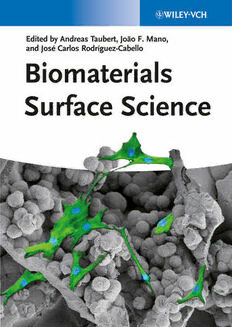Table Of ContentEditedby
AndreasTaubert,Joa˜oF.Mano,
andJ.CarlosRodr´ıguez-Cabello
BiomaterialsSurfaceScience
RelatedTitles
Pompe,W.,Ro¨del,G., Chi,L.(ed.)
Weiss,H.,Mertig,M.
Nanotechnology
Bio-Nanomaterials
Volume8:NanostructuredSurfaces
DesigningMaterialsInspiredbyNature
2010
2013 ISBN:978-3-527-31739-4
ISBN:978-3-527-41015-6;alsoavailablein
digitalformats
Kumar,C.S.(ed.)
NanostructuredThinFilmsand
Santin,M.,Phillips,G.J.(eds.)
Surfaces
Biomimetic, Bioresponsive,and
Bioactive Materials 2010
AnIntroductiontoIntegratingMaterials ISBN:978-3-527-32155-1
withTissues
Kumar,C.S.(ed.)
2012
ISBN:978-0-470-05671-4;alsoavailablein Biomimetic andBioinspired
digitalformats Nanomaterials
Mano,J.F.(ed.) 2010
ISBN:978-3-527-32167-4
BiomimeticApproachesfor
Biomaterials Development
¨
Ochsner,A.,Ahmed,W.(eds.)
2012 BiomechanicsofHardTissues
ISBN:978-3-527-32916-8;alsoavailablein
Modeling,Testing,andMaterials
digitalformats
2010
Li,J.,He,Q.,Yan,X. ISBN:978-3-527-32431-6;alsoavailablein
MolecularAssemblyof digitalformats
BiomimeticSystems
¨
Ochsner,A.,Murch,G.E.,deLemos,M.J.
2011 (eds.)
ISBN:978-3-527-32542-9;alsoavailablein
CellularandPorousMaterials
digitalformats
ThermalPropertiesSimulationand
Prediction
Knoll,W.,Advincula,R.C.(eds.)
FunctionalPolymerFilms 2008
ISBN:978-3-527-31938-1;alsoavailablein
2VolumeSet
digitalformats
2011
ISBN:978-3-527-32190-2;alsoavailablein
digitalformats
Edited by Andreas Taubert, Joa˜o F. Mano,
and J. Carlos Rodr´ıguez-Cabello
Biomaterials Surface Science
TheEditors AllbookspublishedbyWiley-VCHare
carefullyproduced.Nevertheless,authors,
editors,andpublisherdonotwarrantthe
Prof.AndreasTaubert
informationcontainedinthesebooks,
UniversityofPotsdam
includingthisbook,tobefreeoferrors.
InstituteofChemistry
Readersareadvisedtokeepinmindthat
Karl-Liebknecht-Straße24-25
statements,data,illustrations,procedural
14476Potsdam-Golm
detailsorotheritemsmayinadvertentlybe
Germany
inaccurate.
Prof.Joa˜oF.Mano
UniversityofMinho LibraryofCongressCardNo.:appliedfor
3B’sResearchGroup
PolymersAvePark BritishLibraryCataloguing-in-Publication
S.ClaudiodoBarco Data
4806-909CaldasdasTaipas Acataloguerecordforthisbookisavailable
Portugal fromtheBritishLibrary.
Prof.J.CarlosRodrı´guez-Cabello Bibliographicinformationpublishedbythe
UniversidaddeValladolid DeutscheNationalbibliothek
Ctro.InvestigacionCientifica TheDeutscheNationalbibliothek
PaseodeBele´n,s/n liststhispublicationintheDeutsche
47011Valladolid Nationalbibliografie;detailedbibliographic
Spain dataareavailableontheInternetat
<http://dnb.d-nb.de>.
©2013Wiley-VCHVerlagGmbH&Co.
KGaA,Boschstr.12,69469Weinheim,
Germany
Allrightsreserved(includingthoseof
translationintootherlanguages).Nopart
ofthisbookmaybereproducedinany
form–byphotoprinting,microfilm,orany
othermeans–nortransmittedortranslated
intoamachinelanguagewithoutwritten
permissionfromthepublishers.Registered
names,trademarks,etc.usedinthisbook,
evenwhennotspecificallymarkedassuch,
arenottobeconsideredunprotectedbylaw.
PrintISBN:978-3-527-33031-7
ePDFISBN:978-3-527-64963-1
ePubISBN:978-3-527-64962-4
MobiISBN:978-3-527-64961-7
oBookISBN:978-3-527-64960-0
CoverDesign AdamDesign,Weinheim
Typesetting LaserwordsPrivateLtd.,
Chennai,India
PrintingandBinding MarkonoPrintMedia
PteLtd,Singapore
PrintedinSingapore
Printedonacid-freepaper
V
Contents
Preface XVII
ListofContributors XXI
PartI PolymerSurfaces 1
1 ProteinsforSurfaceStructuring 3
AlexanderSchulz,StephanieHiltl,PatrickvanRijn,andAlexanderBo¨ker
1.1 Introduction 3
1.2 StructuringandModificationofInterfacesbySelf-Assembling
Proteins 3
1.2.1 FormationandModificationofProteinStructuresatLiquid
Interfaces 4
1.2.1.1 Silaffins 4
1.2.1.2 Hydrophobins 5
1.2.2 FormationandModificationofProteinStructuresatSolidInterfaces 8
1.2.2.1 Silicateins 8
1.3 StructuringandModificationofSolidSurfacesviaPrintingof
Biomolecules 11
1.3.1 IntaglioPrintingUsingNanostructuredWrinkleSubstrates 11
1.3.1.1 Wrinkling:NanostructuredTemplates 11
1.3.1.2 AssemblyofBionanoparticlesonWrinkles 12
1.3.1.3 IntaglioPrintingofTobaccoMosaicVirus 14
1.3.2 MicrocontactPrintingforBioinspiredSurfaceModification 16
1.3.2.1 MicrocontactPrintingontoSelf-AssembledMonolayers 16
1.3.2.2 MicrocontactPrintingwithWrinkleStamps 16
1.3.2.3 MicrocontactPrintingwithPorousStamps 18
1.3.2.4 EnhancedMicrocontactPrinting 20
1.4 ConclusionandOutlook 22
References 22
VI Contents
2 Surface-GraftedPolymerBrushes 27
SzczepanZapotoczny
2.1 Introduction 27
2.2 SynthesisofPolymerBrushes 28
2.3 Stimuli-ResponsivePolymerBrushes 30
2.4 PolyelectrolyteBrushes 33
2.5 Bio-FunctionalizedPolymerBrushes 35
Acknowledgment 37
References 37
3 InhibitingNonspecificProteinAdsorption:Mechanisms,Methods,
andMaterials 45
MojtabaBinazadeh,HongboZeng,andLarryD.Unsworth
3.1 Introduction 45
3.2 UnderlyingForcesResponsibleforNonspecificProteinAdsorption 46
3.2.1 ProteinStructureEffectsonAdsorptionandAdsorbedFilm
Properties 47
3.3 Poly(EthyleneGlycol) 48
3.4 SurfaceForcesApparatus(SFA) 50
3.5 ApplicationsofPoly(EthyleneGlycol) 53
Summary 55
References 55
4 Stimuli-ResponsiveSurfacesforBiomedicalApplications 63
RuiR.Costa,Nata´liaM.Alves,J.CarlosRodr´ıguez-Cabello,
andJoa˜oF.Mano
4.1 Introduction 63
4.2 SurfaceModificationMethodologies:HowtoRenderSubstrateswith
StimuliResponsiveness 64
4.2.1 Self-AssembledMonolayers 64
4.2.2 ThinPolymerNetworkFilms 65
4.2.3 Grafting 66
4.2.4 Layer-by-Layer 68
4.3 ExploitableStimuliandModelSmartBiomaterials 69
4.3.1 PhysicalStimuli 69
4.3.1.1 Temperature 69
4.3.1.2 Light 71
4.3.2 ChemicalStimuli 72
4.3.2.1 pH 72
4.3.2.2 IonicStrength 73
4.3.3 BiochemicalStimuli 73
4.3.3.1 Antigens 73
4.3.3.2 Enzymes 73
4.3.3.3 Glucose 74
4.3.4 Multiple-ResponsiveSurfaces 74
Contents VII
4.4 BiomedicalApplicationsofSmartSurfaces 75
4.4.1 SmartCoatingsforTissueEngineering,RegenerativeMedicine,
andDrugDeliveryApplications 75
4.4.2 SmartBiomineralization 77
4.4.3 CellSheetEngineering 78
4.5 Conclusions 79
Acknowledgments 79
References 80
5 SurfaceModificationofPolymericBiomaterials 89
AysunGuney,FilizKara,OzgeOzgen,EdaAyseAksoy,VasifHasirci,
andNesrinHasirci
5.1 Introduction 89
5.2 EffectofMaterialSurfacesonInteractionswithBiologicalEntities 90
5.2.1 FundamentalAspectsofBiologicalResponsestoBiomaterials 90
5.2.2 SurfacePropertiesofPolymericBiomaterials 92
5.3 SurfaceMorphologyofPolymericBiomaterials 96
5.3.1 PhysicalMethods 97
5.3.1.1 PhysicalAdsorption 97
5.3.1.2 SurfaceMicro-andNanopatterning 99
5.3.1.3 Langmuir–Blodgett(LB)FilmDeposition 100
5.3.2 ChemicalMethods 102
5.3.2.1 OzoneTreatment 102
5.3.2.2 Silanization 103
5.3.2.3 Fluorination 104
5.3.2.4 WetTreatments 104
5.3.2.5 FlameTreatment 105
5.3.2.6 IncorporationofFunctionalGroups 105
5.3.3 BiologicalMethods 106
5.3.3.1 Protein–EnzymeImmobilization 107
5.3.4 RadiationMethods 109
5.3.4.1 PlasmaRadiation 110
5.3.4.2 MicrowaveandCoronaDischarge 113
5.3.4.3 PhotoactivationbyUV 114
5.3.4.4 Laser 115
5.3.4.5 IonBeam 115
5.3.4.6 GammaIrradiation 115
5.3.5 ImprovementofHydrophilicity 115
5.4 SurfaceModificationstoImproveBiocompatibilityofBiomaterials 118
5.4.1 AdsorptionofProteins 118
5.4.1.1 PatterningoftheSurfaces 120
5.5 SurfaceModificationstoImproveHemocompatibility
ofBiomaterials 126
5.5.1 Blood–MaterialInteraction 126
5.5.2 FactorsInfluencingHemocompatibility 129
VIII Contents
5.5.3 ModificationTechniquesforHemocompatibleSurfaces 131
5.6 SurfaceModificationstoImproveAntibacterialPropertiesof
Biomaterials 134
5.6.1 BacterialInfectionsAssociatedwithBiomaterials 134
5.6.2 BacteriaandMaterialInteraction 135
5.6.3 ModificationTechniquesforObtainingAntibacterialSurfaces 137
5.6.3.1 SurfaceCoatingswithAntibiotics 138
5.6.3.2 SurfaceCoatingswithSilver 139
5.6.3.3 SurfaceModificationswithAntibacterialAgents 140
5.7 Nanoparticles 142
References 143
6 PolymerVesiclesonSurfaces 159
AgnieszkaJagoda,JustynaKowal,MihaelaDelcea,CorneliaG.Palivan,
andWolfgangMeier
6.1 Introduction 159
6.2 PolymerVesicles 160
6.2.1 PolymerVesiclesinSolution 160
6.2.1.1 Self-Assembly 160
6.2.1.2 AmphiphilicCopolymers 161
6.2.1.3 PreparationofPolymerVesicles 161
6.2.1.4 PropertiesofPolymerVesicles 162
6.2.2 PolymerVesiclesTetheredtoSurfaces 164
6.2.2.1 SurfacePreparation 165
6.2.2.2 ImmobilizationProcedures 166
6.2.3 CharacterizationofVesicles,Surfaces,andVesiclesonSurfaces 168
6.2.4 CharacterizationofVesiclesinSolution 169
6.2.4.1 ScatteringMethods 169
6.2.4.2 MicroscopicTechniques 173
6.2.5 SolidSupportCharacterization 176
6.2.6 VesiclesonSurfaces 177
6.3 ApplicationsofPolymerMembranesandVesiclesasSmartandActive
Surfaces 180
6.3.1 SurfaceFunctionalizationofPolymericMembranesandVesicles 182
6.3.1.1 InsertionofMembraneProteinsinPolymericVesicles 182
6.3.1.2 FunctionalizationofPolymericMembranesandVesicleswith
Antibodies,Peptides,andOtherLigands 183
6.3.2 PolymerMembranesandVesiclesas(Bio)sensors 184
6.3.3 PolymerVesiclesasNanoreactorsforDiagnosticsandTherapy 185
6.3.3.1 EncapsulationofFluorescentMolecules 186
6.3.3.2 EncapsulationofNanoparticles 186
6.3.3.3 PolymerVesiclesasNanoreactors 186
6.4 CurrentLimitationsofPolymerVesiclesandEmergingTrends 187
6.4.1 ReproducibilityandStabilityofPolymerVesicles 187
6.4.2 LoadingEfficiencyofPolymerVesicles 188
Contents IX
6.4.3 CytotoxicityofPolymerVesicles 188
6.4.4 NextGenerationofPolymerVesicles 189
6.5 Conclusions 190
AbbreviationsandSymbols 191
References 193
PartII HydrogelSurfaces 205
7 Protein-EngineeredHydrogels 207
JordanRaphel,AndreinaParisi-Amon,andSarahC.Heilshorn
7.1 IntroductiontoProteinEngineeringforMaterialsDesign 207
7.2 HistoryandDevelopmentofProtein-EngineeredMaterials 207
7.3 ModularDesignandRecombinantSynthesisStrategy 210
7.3.1 ModuleDesign 210
7.3.2 LinkerDesign 212
7.3.3 RecombinantProteinExpression 214
7.4 ProcessingProtein-EngineeredMaterials 216
7.4.1 Cross-LinkingMechanisms 216
7.4.1.1 EffectsofCross-LinkDensity 217
7.4.1.2 ChemicalHydrogels 219
7.4.1.3 PhysicalHydrogels 220
7.4.1.4 Self-AssemblingHydrogelTriggers 222
7.4.2 Protein-EngineeredHydrogelProcessingTechniques 222
7.4.2.1 ThinFilmTechniques 223
7.4.2.2 BulkProteinTechniques 224
7.4.2.3 SurfacePatterningTechniques 226
7.5 Conclusion 228
References 229
8 BioactiveandSmartHydrogelSurfaces 239
J.CarlosRodr´ıguez-Cabello,A.Ferna´ndez-Colino,M.J.Pin˜a,M.Alonso,
M.Santos,andA.M.Testera
8.1 Introduction 239
8.2 MimickingtheExtracellularMatrix 240
8.2.1 ImportanceofMimickingECMStructure:From2Dto3DCulture 240
8.2.2 PatternedSurfaces 242
8.2.2.1 Lithography 242
8.2.2.2 Micromolding 243
8.2.2.3 Nano-Microfluidics 243
8.2.2.4 Biopatterning 243
8.2.2.5 ResponseofCellstoPatternedSurfaces 244
8.3 Hydrogels:WhyAreTheySoSpecial? 245
8.3.1 ChemicalversusPhysicalHydrogels 247
8.3.1.1 ChemicalCross-linking 247
8.3.1.2 BioinspiredPeptidicMotifsforPhysicalCross-linking 250
X Contents
8.3.2 InjectableHydrogels 251
8.3.3 NaturalversusArtificialPolymers 251
8.3.3.1 NaturalPolymers 251
8.3.3.2 ArtificialPolymers 254
8.4 Elastin-LikeRecombinamersasBioinspiredProteins 255
8.4.1 ELRChemicalHydrogels 258
8.4.2 ELRPhysicalHydrogels 259
8.4.3 AddingBiofunctionality 260
8.4.4 Composites 260
8.5 Perspectives 261
Acknowledgments 261
References 261
9 BioresponsiveSurfacesandStemCellNiches 269
MiguelAngelMateos-Timoneda,MelbaNavarro,andJosepAntonPlanell
9.1 GeneralIntroduction 269
9.2 StemCellNiches 271
9.2.1 HematopoieticStemCellNiche 271
9.2.2 EpithelialStemCellNiche 271
9.2.3 NeuralStemCellNiche 272
9.3 SurfacesasStemCellNiches 274
9.3.1 TopographyEffectonStemCellBehavior 275
9.3.2 ImportanceofMechanicalPropertiesonStemCells 276
9.3.3 EngineeringChemicalMicroenvironmentsforStem
Cells 277
9.4 Conclusions 279
References 279
PartIII Hybrid&InorganicSurfaces 285
10 Micro-andNanopatterningofBiomaterialSurfaces 287
DanielBrodoceanuandTobiasKraus
10.1 Introduction 287
10.2 Photolithography 287
10.3 ElectronBeamLithography 290
10.4 FocusedIonBeam 292
10.5 SoftLithography 292
10.6 Dip-PenNanolithography 294
10.7 NanoimprintLithography 295
10.8 SandblastingandAcidEtching 298
10.9 Laser-InducedSurfacePatterning 298
10.10 ColloidalLithography 301
10.11 ConclusionsandPerspectives 303
Acknowledgments 305
References 306

